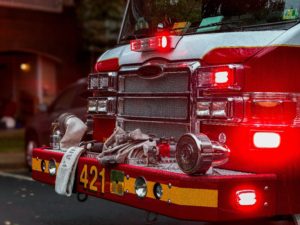It’s Fire Prevention Month – How To Lower Your Risk For a Home Fire
 October is Fire Prevention Month. In this blog, we’ll talk about some of the most common ways a fire can start and we’ll provide you with some tips on how to prevent them from starting.
October is Fire Prevention Month. In this blog, we’ll talk about some of the most common ways a fire can start and we’ll provide you with some tips on how to prevent them from starting.
Smoke Alarms
The number one defense against fires is having a working smoke alarm, so it is crucial that you regularly check to make sure that your alarms are working. Replace your batteries whenever they get low.
If your smoke alarm begins to make an annoying beeping sound, that is your alarm telling you that its batteries are running low on power. It is also a good idea to test your smoke alarm every six months.
It varies from unit to unit, but many times there is a button you can press that will trigger a test alarm. If you try testing it and nothing happens, then that is your sign to buy a new one.
Candles
Candles are a popular item to use this time of year. Candles can easily become a fire hazard if they are left too close to other flammable items, such as drapes or a blanket, or if they happen to tip over.
If you plan on using a candle, make sure you use one that has a wide base, so it doesn’t tip over easily, and you place it away from anything that could be flammable. Also, if you have to leave the room, make sure to always extinguish the candle. Alternatively, the safest option is to use an electric candle since they have an almost zero chance of starting a fire but still produces the same light and fragrance that normal ones do.
Chimney
With the temperature beginning to drop, you might be wanting to start using your chimney soon. It is important you take some precautions first. You should get your chimney inspected annually to prevent any leftover debris or soot that could potentially start a fire.
A good reminder when using your fireplace is to always make sure your fire is completely out when you are done using it. Any leftover embers can start another fire, and if you aren’t around, it’s possible for that fire to get out of control. To avoid this from happening, use a shovel to break up the burnt firewood and spread them out in your fireplace. Then, use sand, ash from the fire, or even baking soda to smother the remaining burning embers so oxygen can’t reach them. Water, however, should never be used since the steam can end up pushing out embers and fire particles from the fireplace into your home.
Appliances
The kitchen is where half of all house fires start according to the National Fire Protection Agency. There are several appliances in a house or apartment that if not used properly or safely can easily become a fire hazard.
One simple tip when using your kitchen: never leave your kitchen unattended if you are cooking.
Many fires in the kitchen start not from the food or oil being cooked, but also by simply leaving flammable items too close to what you are cooking. Examples such as oven mitts, towels, etc. can easily catch fire if left too close to the stove.
Dryers in laundry rooms are an additional appliance that you should be cautious of when you use them. The buildup of lint is one of the biggest reasons a fire can break out in your laundry room. Lint is flammable, and if it is not cleaned out regularly, it will continuously build up and the risk of a fire will grow larger.
Extension cords and power hubs are a convenient way to charge or power all of your electronics, but you need to always make sure you are not overloading them, otherwise, you can risk starting an electrical fire. Before using it, you should read the instructions (if provided) of your extension cord so you’re aware of its limits and how not to exceed them.
If you are using the cord to power a larger appliance, make sure the extension cord can handle the electrical load and don’t overload it by adding additional appliances. You should also purchase cords that have been tested by independent testing labs to help verify its safety; You should see a sticker displaying this on the extension cord and/or its packaging.
We hope these tips have given you better insight into how to prevent fires in your home. If you would like to learn more about fire prevention, or what your homeowners insurance covers in a fire, contact our agency today.


